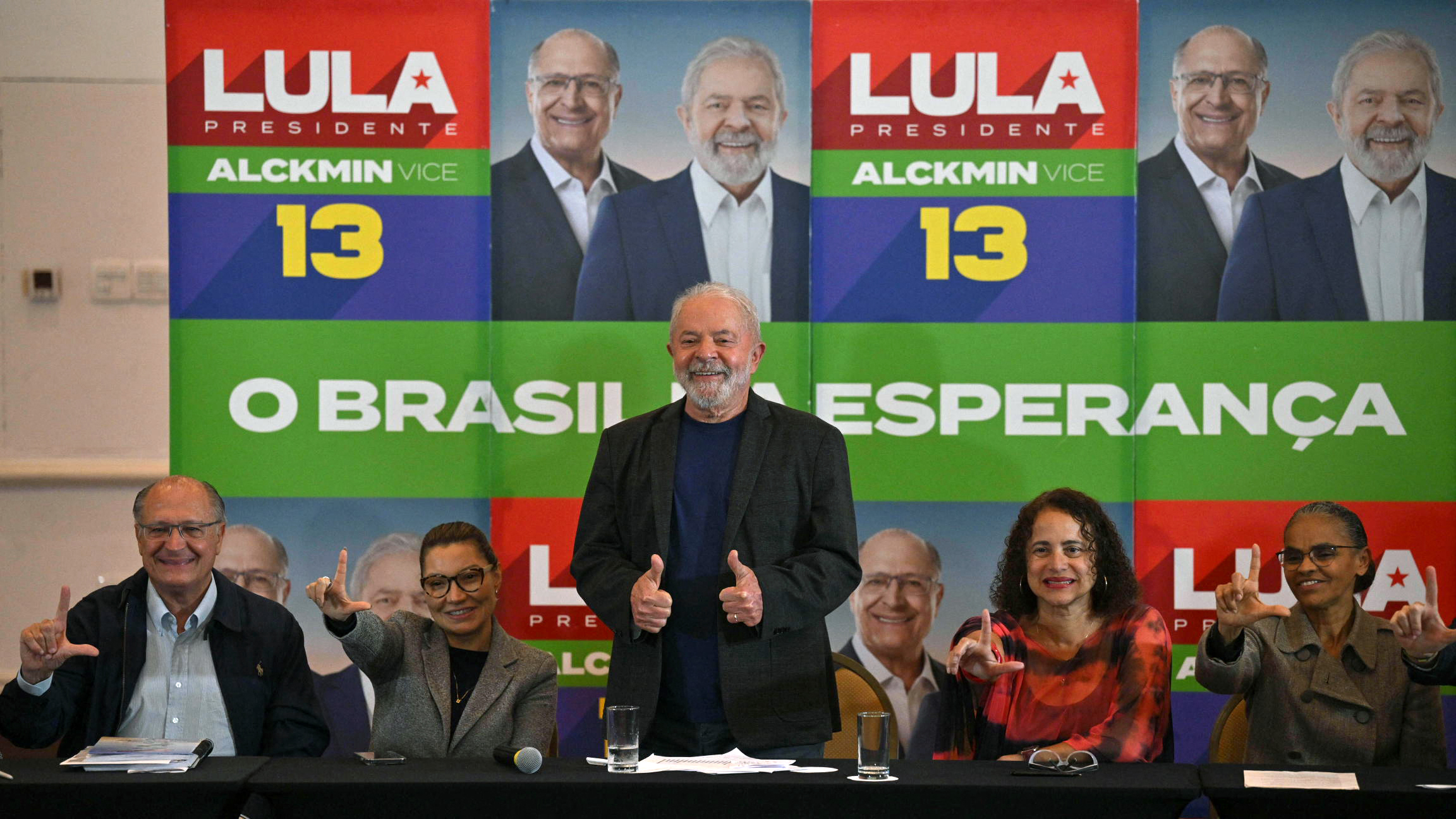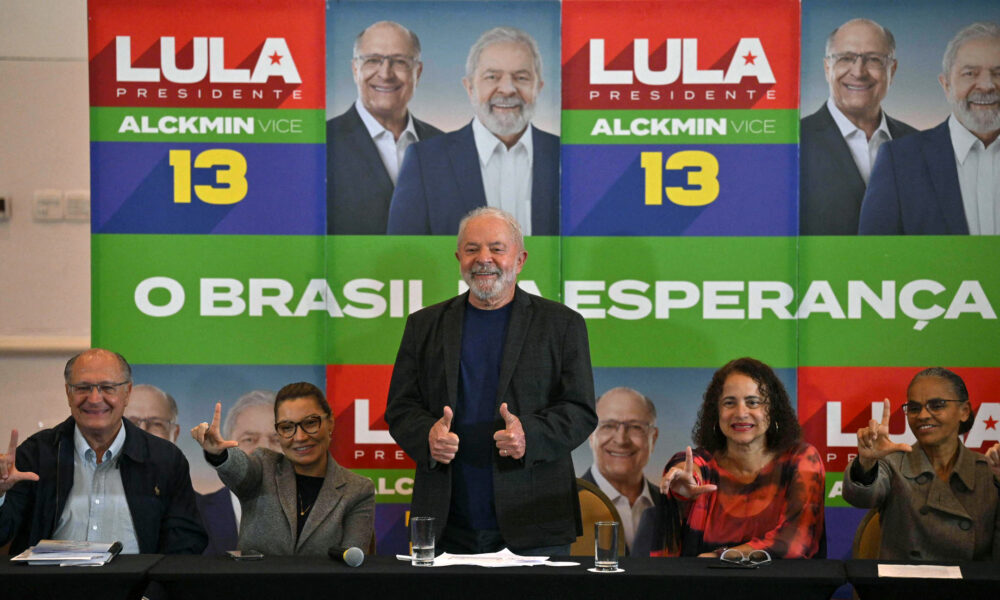International
Lula must fight for center to win Brazil runoff: analysts

AFP | Javier Tovar
To prevail in Brazil’s tighter-than-expected presidential runoff, leftist veteran Luiz Inacio Lula da Silva will have to strike alliances with centrists, woo the business sector and offer voters more than just his legacy, analysts say.
The long-time front-runner may have won Sunday’s first-round vote against far-right incumbent Jair Bolsonaro, but the latter appears to have the momentum, having shattered pollsters’ forecasts of a rout to finish within five points of Lula (48 percent to 43) and force a second round on October 30.
If Lula, the charismatic but tarnished ex-president who led Brazil from 2003 to 2010, is to stymy Bolsonaro, analysts say, he will have to redouble his efforts to win back the political middle, still disillusioned over the devastating corruption charges — since annulled — that controversially sent him to jail in 2018.
The 76-year-old Workers’ Party (PT) founder acknowledged as much himself after Sunday’s disappointing results.
“We’ll have to spend less time preaching to the choir and more time talking to voters… those who appear not to like us,” he said Monday after meeting his campaign team to chart their strategy for the final stretch.
“Little peace-and-love Lula is ready to talk to everyone.”
Deal-making time
Known as a deft politician, Lula will need to tap that acumen to strike alliances.
“He will have to make some gestures and concessions” to the center-left and center-right, whose votes Bolsonaro will also be after, said political analyst Leandro Gabiati, head of consulting firm Dominium.
Lula already made a giant nod to centrists by picking center-right veteran Geraldo Alckmin — the candidate he beat in the 2006 presidential race — as his running mate.
Now he needs to chase the votes that went to Sunday’s third- and fourth-place finishers, center-right candidate Simone Tebet (four percent) and center-left candidate Ciro Gomes (three percent).
Lula got a clutch endorsement Tuesday from Gomes’s Democratic Labor Party (PDT), despite a long history of animosity between the two men.
Gomes grudgingly went along, saying in a video he “supported” the endorsement as “the only exit, under the circumstances.”
Getting the backing of center-right Senator Tebet, an anti-abortion Catholic, could meanwhile be key to luring socially conservative women voters.
She has hinted she is ready to back Lula. But it will be another matter winning over her party, the Brazilian Democratic Movement (MDB), which has a strong pro-Bolsonaro wing.
“Make your decision soon. Mine is already made,” Tebet told the divided party’s leadership.
Big spending shelved
Lula will also have to sell the business sector on his plans for Latin America’s biggest economy.
He presided over a watershed economic boom in the 2000s, blending market-friendly policy with ambitious social programs.
But Bolsonaro has more backing from the market this time around — as seen when stocks surged Monday on his better-than-expected showing.
Lula will have to be “malleable” on economic policy to woo the business sector, said Arthur Ituassu, professor of political communication at Pontifical Catholic University in Rio de Janeiro.
The former president will likely have to renegotiate his plans to expand social spending and overhaul the tax system, Ituassu said.
“That’s going to be fundamental,” he said. “That’s how he wins the volatile center.”
Back to the future?
Lula, who left office basking in a record 87-percent approval rating, also must stop leaning so heavily on his legacy and offer voters concrete, forward-looking policy plans, analysts say.
“He’s only talked about his achievements from his past administrations,” said Paulo Calmon, a political scientist at the University of Brasilia.
“He needs to present plans for the future.”
If that weren’t enough, the former president also will have to perform one final feat of political gymnastics: execute all the above without losing the 57 million votes he won Sunday.
“A lot of voters who aren’t necessarily on the left voted for Lula out of anti-Bolsonaro sentiment,” said Dominium’s Gabiati.
“But if Bolsonaro improves his message, he might reverse that rejection… and win that vote.”
International
U.S. Senate Rejects Budget, Bringing Government Closer to Shutdown Amid DHS Dispute

The U.S. Senate voted on Thursday against a budget proposal in a move aimed at pressuring changes at the Department of Homeland Security (DHS), following the killing of two civilians during a deployment of immigration agents in Minneapolis.
All Senate Democrats and seven Republican lawmakers voted against the bill, which requires 60 votes to advance, pushing the country closer to a partial government shutdown that would cut funding for several agencies, including the Pentagon and the Department of Health.
The rejection came as Senate leaders and the White House continue negotiations on a separate funding package for DHS that would allow reforms to the agency. Proposed measures include banning Immigration and Customs Enforcement (ICE) agents from wearing face coverings and requiring them to use body-worn cameras during operations.
The vote took place just hours after President Donald Trump said he was “close” to reaching an agreement with Democrats and did not believe the federal government would face another shutdown, following last year’s record stoppage.
“I don’t think the Democrats want a shutdown either, so we’ll work in a bipartisan way to avoid it. Hopefully, there will be no government shutdown. We’re working on that right now,” Trump said during a Cabinet meeting at the White House.
International
Trump Says Putin Agreed to One-Week Halt in Attacks on Ukraine Amid Extreme Cold

U.S. President Donald Trump said on Thursday that he secured a commitment from Russian President Vladimir Putinto halt attacks against Ukraine for one week, citing extreme weather conditions affecting the region.
“Because of the extreme cold (…) I personally asked Putin not to attack Kyiv or other cities and towns for a week. And he agreed. He was very pleasant,” Trump said during a Cabinet meeting broadcast by the White House.
Trump acknowledged that several advisers had questioned the decision to make the call.
“A lot of people told me not to waste the call because they wouldn’t agree. And he accepted. And we’re very happy they did, because they don’t need missiles hitting their towns and cities,” the president said.
According to Trump, Ukrainian authorities reacted with surprise to the announcement but welcomed the possibility of a temporary ceasefire.
“It’s extraordinarily cold, record cold (…) They say they’ve never experienced cold like this,” he added.
Ukrainian President Volodymyr Zelensky later commented on the announcement, expressing hope that the agreement would be honored.
International
Storm Kristin Kills Five in Portugal, Leaves Nearly 500,000 Without Power

Storm Kristin, which battered Portugal with heavy rain and strong winds early Wednesday, has left at least five people dead, while nearly half a million residents remained without electricity as of Thursday, according to updated figures from authorities.
The revised death toll was confirmed to AFP by a spokesperson for the National Emergency and Civil Protection Authority (ANPEC). On Wednesday, the agency had reported four fatalities.
Meanwhile, E-Redes, the country’s electricity distribution network operator, said that around 450,000 customers were still without power, particularly in central Portugal.
Emergency services responded to approximately 1,500 incidents between midnight and 8:00 a.m. local time on Wednesday, as the storm caused widespread disruptions.
The Portuguese government described Kristin as an “extreme weather event” that inflicted significant damage across several regions of the country. At the height of the storm, as many as 850,000 households and institutions lost electricity during the early hours of Wednesday.
Several municipalities ordered the closure of schools, many of which remained shut on Thursday due to ongoing adverse conditions.
Ricardo Costa, regional deputy commander of the Leiria Fire Brigade, said residents continue to seek assistance as rainfall persists.
“Even though the rain is not extremely intense, it is causing extensive damage to homes,” he noted.
In Figueira da Foz, a coastal city in central Portugal, strong winds toppled a giant Ferris wheel, underscoring the severity of the storm.
-

 Central America3 days ago
Central America3 days agoGuatemala seizes over a ton of cocaine hidden in flour at Pacific port
-

 International4 days ago
International4 days agoDelcy Rodríguez seeks political agreements after Maduro’s ouster
-

 International3 days ago
International3 days agoHistoric snowstorm paralyzes Toronto after 60 centimeters of snow
-

 International3 days ago
International3 days agoSpain’s irregular migrant population rises to 840,000, study finds
-

 Central America2 days ago
Central America2 days agoGuatemala Police Arrest Prison Guard Caught in the Act of Extortion
-

 Central America2 days ago
Central America2 days agoHonduras swears in conservative president Asfura after disputed election
-

 International4 days ago
International4 days agoFederal immigration agents kill man in Minneapolis, sparking protests and outrage
-

 International1 day ago
International1 day agoFootball Fan Killed in Clashes After Colombian League Match
-

 Central America2 days ago
Central America2 days agoBukele leads public trust rankings as UCA survey highlights gains in security
-

 International2 days ago
International2 days agoWinter Storm Fern Leaves 30 Dead and Over One Million Without Power Across the U.S.
-

 International2 days ago
International2 days agoDoomsday clock moves to 85 seconds before midnight amid rising global risks
-

 Sin categoría2 days ago
Sin categoría2 days agoEight Killed in Series of Armed Attacks in Ecuador’s Manabí Province
-

 International3 days ago
International3 days agoRights group says nearly 6,000 killed in Iran protest crackdown
-

 International1 day ago
International1 day agoMissing Spanish Sailor Rescued After 11 Days Adrift in Mediterranean
-

 International1 day ago
International1 day agoRubio Says U.S. Could Participate in Follow-Up Russia-Ukraine Talks
-

 Central America1 day ago
Central America1 day agoGuatemala President Says Starlink Terminal Found Inside Prison
-

 International2 days ago
International2 days agoSpain approves plan to regularize up to 500,000 migrants in Historic Shift
-

 Sin categoría2 days ago
Sin categoría2 days agoEl Salvador Launches Fourth Year of Ocean Mission to Protect Marine Ecosystems
-

 International3 days ago
International3 days agoVenezuela frees at least 80 political prisoners, NGO says
-

 International3 days ago
International3 days agoEU launches new probe into X over AI-generated fake nude images
-

 International3 days ago
International3 days agoSevere winter storm grips U.S., leaves multiple dead as extreme cold persists
-

 International3 days ago
International3 days agoFrance debates ban on social media for children under 15
-

 International2 hours ago
International2 hours agoU.S. Senate Rejects Budget, Bringing Government Closer to Shutdown Amid DHS Dispute
-

 International2 hours ago
International2 hours agoMan Arrested After Vehicle Crashes Into Jewish Institution in Brooklyn
-

 International2 hours ago
International2 hours agoStorm Kristin Kills Five in Portugal, Leaves Nearly 500,000 Without Power
-

 International2 hours ago
International2 hours agoTrump Says Putin Agreed to One-Week Halt in Attacks on Ukraine Amid Extreme Cold




























